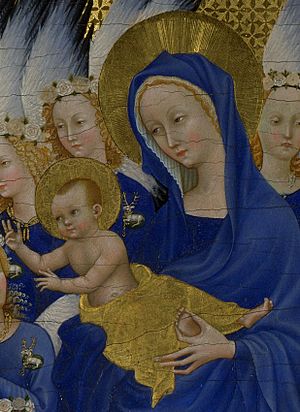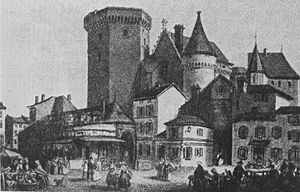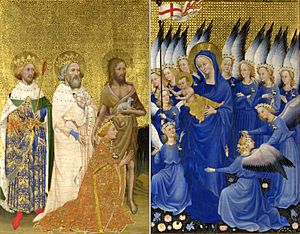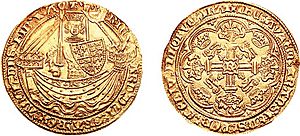Edward of Angoulême facts for kids
Quick facts for kids Edward of Angoulême |
|
|---|---|

Possible depiction of Edward and his mother Joan as the infant Jesus and the Virgin Mary on the Wilton Diptych, c. 1395
|
|
| Born | 27 January 1365 Château d'Angoulême, France |
| Died | c. 20 September 1370 (aged 5) Bordeaux, France |
| Burial | Austin Friars, London Kings Langley (1388/9–bef. 1607) Bordeaux (1370–1388/9) |
| House | Plantagenet |
| Father | Edward the Black Prince |
| Mother | Joan, Countess of Kent |
Edward of Angoulême (born January 27, 1365 – died around September 20, 1370) was an important young prince. He was the eldest son of Edward, the Black Prince, a famous English warrior. His mother was Joan, Countess of Kent. Edward was born in Angoulême, a town in France.
At the time of his birth, Edward was second in line to the throne of England. This meant he was very close to becoming king. His family belonged to the House of Plantagenet, a powerful royal family. Edward's birth happened during the Hundred Years' War, a long conflict between England and France. His father and other kings, like Charles V of France, celebrated his arrival with great joy.
Sadly, Edward died when he was only five years old. His younger brother, Richard of Bordeaux, then became the next in line to the throne. After their father, the Black Prince, died in 1376, Richard became the official heir apparent to his grandfather, Edward III. Richard later became King Richard II. He cared deeply for his brother. Richard even ordered a special monument for Edward's tomb. He also possibly had his brother shown in a famous painting called the Wilton Diptych.
Contents
Life of Prince Edward
Birth of a Prince
Edward was born at the Château d'Angoulême. This castle was in Angoulême, which was then part of the Duchy of Aquitaine in France. His name, Edward of Angoulême, shows where he was born. This was a common way to name people in England in the 1300s.
Through his father, Edward the Black Prince, Edward was part of the House of Plantagenet. This made him the second grandson of the English king, Edward III. Edward was also related to the French royal family, the House of Valois. This connection came through his grandmother, Philippa of Hainault. His mother, Joan of Kent, was his father's cousin. She was also the Countess of Kent in her own right.
Edward's exact birth date was once debated by historians. But a letter from his mother, Joan, to King Edward III confirms it. She wrote on February 4, 1365, that Edward was born on January 27. So, January 27, 1365, is the date most people use. King Edward III was very happy about his grandson's birth. He even gave a special reward to the messenger who brought the news.
Edward was baptized at the Château d'Angoulême in March 1365. His father, the Black Prince, loved grand events. Edward's baptism was a huge celebration. It showed the people of Aquitaine that they had a powerful prince. Many important lords and knights attended. A lot of money was spent on candles alone! The baptism also included exciting tournaments. One of his godparents was Bishop Jean de Crois. The name Edward was chosen because it had been used by three English kings. It was a popular and important name for princes.
The Prince's Early Death
Edward suffered from an illness and died from the Black Death, a terrible plague. The exact date of his death is not fully known. But it is believed to be around September 20, 1370. This date is close to the "feast of Saint Michael" (September 29), as mentioned in an old record.
Edward's father, the Black Prince, was very sad when he heard the news. He had just returned from a battle. Edward's death was a great sorrow for both his parents. It also made the Black Prince's own long illness even worse. Edward was said to have a kind and good character, even as a young child. Historians believe he showed signs of the great qualities seen in his father and grandfather.
The Black Prince, Joan, and young Richard returned to England in 1371. The Black Prince died there in 1376 after many years of illness. Before they left France, the Black Prince asked his brother, John of Gaunt, 1st Duke of Lancaster, to arrange Edward's funeral. The funeral took place in Bordeaux, France. Many important leaders from the region attended.
Edward's body was later moved to England in 1388 or 1389. This was done by Robert Waldby, a bishop, following King Richard II's orders. Edward was buried at a priory called "Chilterne Langley," also known as Children's Langley. Later, the church at Kings Langley was ruined. Edward's remains were moved again. By 1598, he was re-buried at the Church of the Austin Friars in London.
Even though Richard was very young when Edward died, he remembered his brother fondly. Edward might be shown in the Wilton Diptych. This is a small painting that shows King Richard kneeling. He is shown before the Virgin Mary (who might be Joan of Kent) and the Child (who might be Edward). This painting is now kept at the National Gallery in London.
Edward's Impact on History
Edward's early death caused great sadness for his family. Historian Alison Weir wrote that after Edward died, his father, the Black Prince, was "a broken man." Edward's death also had a big impact on English history.
Even when Edward was alive, some people worried that his uncle, John of Gaunt, might try to claim the throne. To prevent this, Parliament passed a law in 1368. This law said that children born in English lands in France could still inherit the English throne. This was to make sure Edward and Richard's right to succeed was clear.
After King Edward III died, Richard became king. Because Edward had died, Richard was the next in line. This helped avoid a situation where John of Gaunt might have ruled as a regent (someone who rules for a young king). However, John of Gaunt remained very powerful for several years.
Richard was only ten years old when he became king. Later in his reign, he faced many challenges. England was still fighting the Hundred Years' War, which his grandfather had started. Richard tried to end the war, but he faced opposition from his nobles. France also refused to give up lands to England. In 1399, Richard was put in the Tower of London. He then gave up his throne to his cousin, who became King Henry IV. When Richard died in 1400, the direct line of the House of Plantagenet ended.
Images for kids
 | Bayard Rustin |
 | Jeannette Carter |
 | Jeremiah A. Brown |





